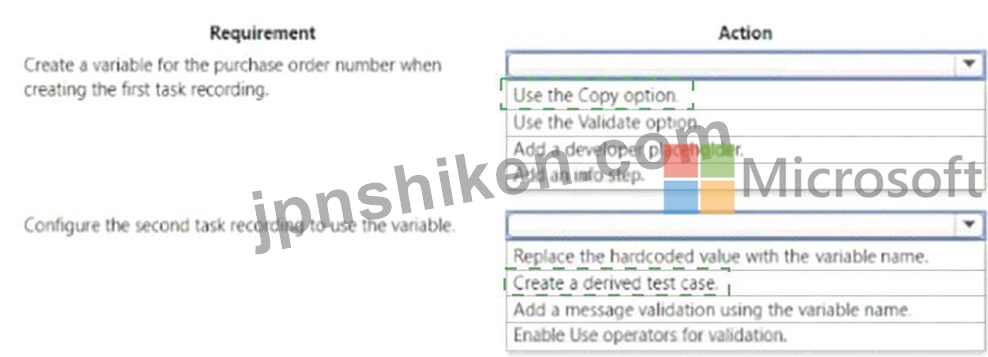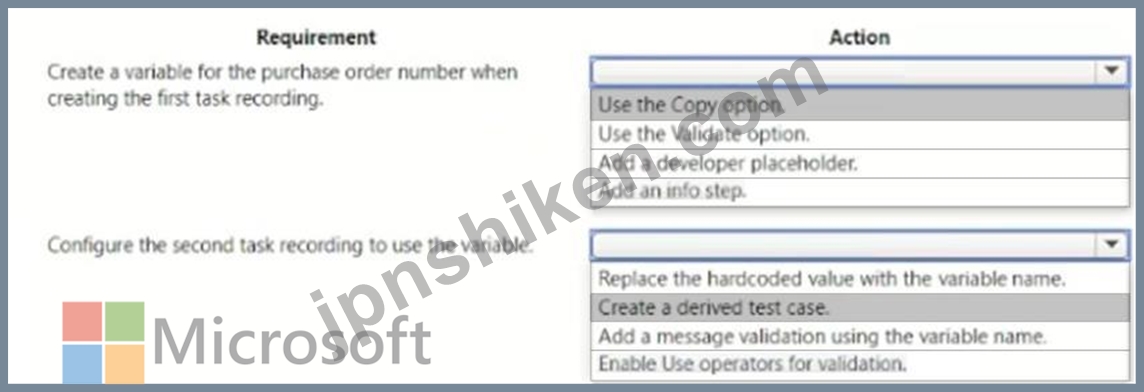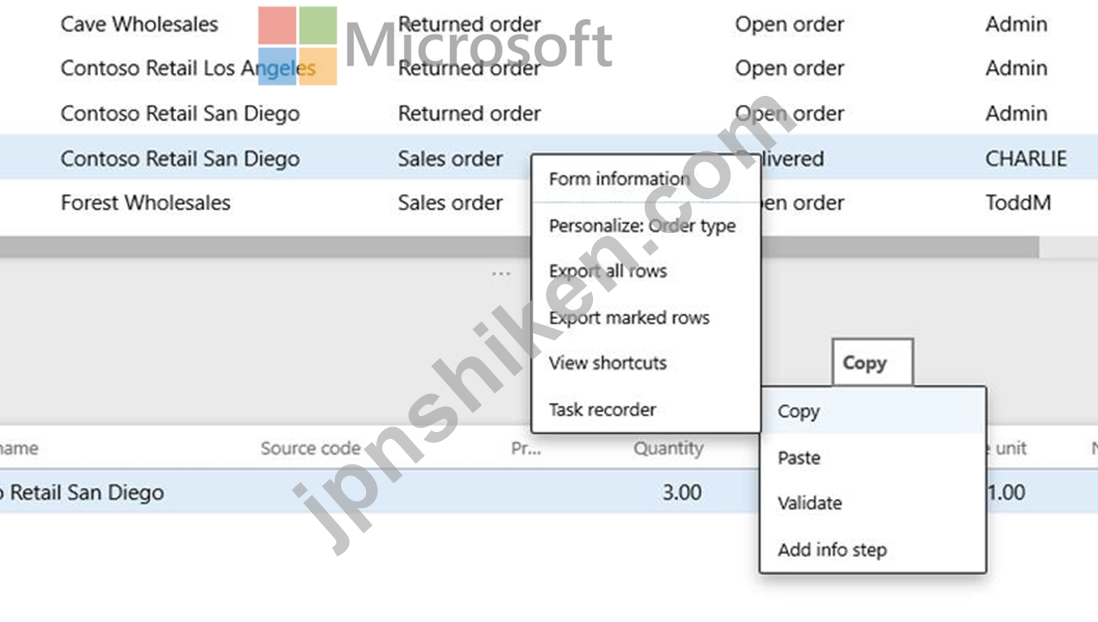- ホーム
- Microsoft
- MB-300J - Microsoft Dynamics 365: Core Finance and Operations (MB-300日本語版)
- Microsoft.MB-300J.v2023-08-26.q152
- 質問94
有効的なMB-300J問題集はJPNTest.com提供され、MB-300J試験に合格することに役に立ちます!JPNTest.comは今最新MB-300J試験問題集を提供します。JPNTest.com MB-300J試験問題集はもう更新されました。ここでMB-300J問題集のテストエンジンを手に入れます。
MB-300J問題集最新版のアクセス
「390問、30% ディスカウント、特別な割引コード:JPNshiken」
Dynamites 365 Supply Chain Management を実装しています。Regression Suite Automation Tool (RSAT) を使用して、ソリューションをテストします。
次のテスト ケースを作成する予定です。
* 新しい注文書を作成する
* 注文書を受け取ります。
テスト ケースを連結するには、構成を完了する必要があります。
どのように構成を競う必要がありますか? 回答するには、回答エリアで適切な構成を選択します。
注: それぞれの正しい選択は 1 ポイントの価値があります。

次のテスト ケースを作成する予定です。
* 新しい注文書を作成する
* 注文書を受け取ります。
テスト ケースを連結するには、構成を完了する必要があります。
どのように構成を競う必要がありますか? 回答するには、回答エリアで適切な構成を選択します。
注: それぞれの正しい選択は 1 ポイントの価値があります。

正解:

Explanation
Graphical user interface, text, application Description automatically generated

Box 1: Use the Copy option
Copy variables to chain test cases
One of the key features of the Regression Suite Automation Tool is the chaining of test cases, that is, the ability of a test to pass values to other tests. Test cases are executed according to their defined order in the Azure DevOps test plan, which can also be updated in the test tool itself. It is important to correctly order the tests if you want to pass variables from one test case to the other.
To save the value of a variable while recording the test in Task Recorder, right-click the field and select Task recorder > Copy, as shown in the following image. Copying will save the variable in the recording file. This variable can be used in subsequent tests.
Graphical user interface, application Description automatically generated

Box 2: Create a derived test case
Derived test cases
The Regression suite automation tool (RSAT) lets you use the same task recording with multiple test cases, so that you can run a task with different data configurations. Select a test case in the Regression suite automation tool and then select New > Create Derived Test Case. This creates a child test case in Azure DevOps. The resulting derived test case is linked to its parent test case in Azure DevOps. It has an Excel parameters file attached but no recording file. The derived test case will appear in the Regression suite automation tool grid under the same test suite with the Derived column selected. By default, derived test cases are named after their parent test case with a numeric suffix.
Reference:
https://learn.microsoft.com/en-us/dynamics365/fin-ops-core/dev-itpro/perf-test/rsat/rsat-chain-test-cases
- 質問一覧「152問」
- 質問1 カスタマーサービス担当者が払い戻しリクエストを開始できること
- 質問2 あなたは Dynamic 365 Finance と Dynamics 365 supply Chain Ma...
- 質問3 会社は Dynamics 365 Commerce を実装しています。 従業員は、次...
- 質問4 更新のために回帰テストとユーザー通知プロセスを構成する必要が
- 質問5 Dynamics 365 for Finance and Operationsシステム管理者です。 ...
- 質問6 注:この質問は、同じシナリオを提示する一連の質問の一部です。
- 質問7 会社の新しい Dynamics 365 アプリの展開を構成しています。 会...
- 質問8 Dynamics 365 for Finance and Operationsを使用しているシステ...
- 質問9 Dynamics 365 Finance を使用している会社に、新しいデータ入力...
- 質問10 営業担当者のインポート方法を設定する必要があります。あなたは
- 質問11 組織のDynamics 365 for Finance and Operations展開での使いや...
- 質問12 組織のDynamics 365 Finance展開の使いやすさを強化したい。 定...
- 質問13 実装計画プロセス中に、会社はレガシーシステムからさまざまな機
- 質問14 会社はDynamics365 CustomerEngagementを使用しています。同社は...
- 質問15 新しいDynamics 365 Financeリリースのユーザー回帰テストをいつ...
- 質問16 企業は Dynamics 365 Finance を実装します 同社は、自動テスト...
- 質問17 注:この質問は、同じシナリオを提示する一連の質問の一部です。
- 質問18 Dynamics 365 for Finance and Operationsの新しいインスタンス...
- 質問19 会社は5月1日を会計年度の開始として使用します。 会社の経営陣...
- 質問20 Dynamics 365 Finance でカスタム機能をサポートします。 あなた...
- 質問21 ある会社は、二重書き込みを使用して、Dynamic 365 と Dynamic 3...
- 質問22 ある会社は、倉庫内のディスプレイのPowerBlダッシュボードに倉...
- 質問23 Excelとの統合を構成する必要があります。 どのように構成を完了...
- 質問24 会社は、Dynamics 365 for Finance and Operationsを実装し、Mic...
- 質問25 会社は Dynamic 365 Finance を実装しています。 更新プログラム...
- 質問26 Dynamics 365 for Finance and Operations環境を管理します。ユ...
- 質問27 クライアントは、稼働開始の準備をするために顧客を Dynamics 36...
- 質問28 Dynamics 365 Supply Chain Management を実装しています。 サー...
- 質問29 Dynamics 365Financeデータエンティティを他のデータストアと統...
- 質問30 あなたはContosoEntertainment System USA(USMF)の機能コンサ...
- 質問31 会社は、Dynamics 365 for Finance and Operationsを実装してい...
- 質問32 拡張をサポートする機能を特定する必要があります。 どの機能を
- 質問33 企業は、複数のレガシー データベースからデータを移動し、個別
- 質問34 あなたはContosoEntertainment System USA(USMF)の機能コンサ...
- 質問35 会社は Dynamic 365 Supply chain management を使用しています...
- 質問36 Dynamics 365 Finance の実装中にテストを実行する予定です。 テ...
- 質問37 クライアントがDynamics 365 Financeを実行します。 クライアン...
- 質問38 Dynamics 365 for Finance and Operationsシステム管理者です。 ...
- 質問39 新しいリリース要件に役立つテクノロジーを特定する必要がありま
- 質問40 あなたはContosoEntertainment System USA(USMF)の機能コンサ...
- 質問41 Dynamics 365 Supply Chain Management で定期的な統合を構成し...
- 質問42 Dynamics 365 Supply Chain Management を実装しています。 従業...
- 質問43 クライアントの技術サポート要件に対応する必要があります。 ど
- 質問44 ある企業が Dynamics 365 Supply Chain Management を実装してい...
- 質問45 新しいDynamics365Financeインスタンスを作成します。 複数のサ...
- 質問46 Dynamics 365 for Finance and Operations実装コンサルタントで...
- 質問47 あなたはDynamics 365 Financeのシステム管理者です。 ユーザー...
- 質問48 会社は、データ管理フレームワークを使用してデータをインポート
- 質問49 アカウント担当者向けに顧客の編集プロセスをストリーミングする
- 質問50 社内のユーザーにセキュリティロールを割り当てます。セキュリテ
- 質問51 Dynamics 365Financeを実装しています。 テストを実行する必要が...
- 質問52 あなたは、Dynamics 365 Finance を使用する会社のセキュリティ...
- 質問53 Dynamics 365 for Finance and Operationsを実装している会社の...
- 質問54 注: この質問は、同じシナリオを提示する一連の質問の一部です。...
- 質問55 企業は、Dynamics 365 for Finance and Operationsと連携するよ...
- 質問56 会社は、Finance and Operations アプリを実装しています。 必要...
- 質問57 会社は、組織の関係を管理するために組織階層をセットアップする
- 質問58 組織は、Dynamics 365 for Finance and Operationsを実装してい...
- 質問59 企業がDynamics 365 Financeを実装しています。同社は、いくつか...
- 質問60 会社はDynamics365Financeを使用しています。 User1は、経費報告...
- 質問61 会社は、Dynamics 365 for Finance and Operationsのケース管理...
- 質問62 あなたはDynamics 365 Financeのシステム管理者です。 注文番号...
- 質問63 注:この質問は、同じシナリオを提示する一連の質問の一部です。
- 質問64 注:この質問は、同じシナリオを提示する一連の質問の一部です。
- 質問65 あなたはContosoEntertainment System USA(USMF)の機能コンサ...
- 質問66 Dynamics 365 Commerce を使用して、展開のカスタマイズを完了し...
- 質問67 既存の Dynamics 365 Finance および Dynamics 365 Supply Chain...
- 質問68 会社がDynamics 365 Financeを実装しています。 実装チームは、...
- 質問69 あなたは Dynamic 365 Finance システムの管理者です。 システム...
- 質問70 Dynamics 365 for Finance and Operationsシステム管理者です。 ...
- 質問71 ある企業が Dynamics 365 Finance を実装しています。 同社は、...
- 質問72 ある会社が、レガシーシステムから財務および運用向けDynamics 3...
- 質問73 Dynamics 365 for Finance and Operationsシステム管理者です。...
- 質問74 Dynamic 365 Finance を実装しています。 新しい請求仕訳帳が転...
- 質問75 Dynamics 365 Supply chain Management を実装しています。Dynam...
- 質問76 アプリケーションと環境の要件を満たすには、User1 のデータ移行...
- 質問77 あなたはDynamics365Financeシステム管理者です。 ユーザーが販...
- 質問78 Dynamics 365 for Finance and Operationsシステム管理者です。 ...
- 質問79 Microsoft Excel ブックから Dynamics 365 Supply Chain Managem...
- 質問80 病院は、Dynamics 365Financeの新しいインスタンスを展開するこ...
- 質問81 データをパイロットインスタンスにインポートするとエラーが表示
- 質問82 企業は Dynamics 365 Supply Chain Management を使用しています...
- 質問83 モバイルアプリを使用して新しいプロセスを実装する必要がありま
- 質問84 ある会社は、Dynamics 365 の財務および運用アプリを使用して既...
- 質問85 営業担当者から報告されたエラーの原因と理由をトラブルシューテ
- 質問86 生きるために1週間も貧弱な現在のリスクポイントを特定する必要
- 質問87 注:この質問は、同じシナリオを提示する一連の質問の一部です。
- 質問88 あなたはContosoEntertainment System USA(USMF)の機能コンサ...
- 質問89 注:この質問は、同じシナリオを提示する一連の質問の一部です。
- 質問90 組織は Dynamic 365 Finance を実装しています。 この組織は、Co...
- 質問91 データ管理者がタスクを実行するために必要なDynamics365コンポ...
- 質問92 あなたはContosoEntertainment System USA(USMF)の機能コンサ...
- 質問93 あなたはContosoEntertainment System USA(USMF)の機能コンサ...
- 質問94 Dynamites 365 Supply Chain Management を実装しています。Regr...
- 2コメント質問95 アカウント担当者用にシステムを構成する必要があります。 実行
- 質問96 会社は Dynamics 365 Finance を使用しています。同社は、一般仕...
- 質問97 クライアントは、さまざまなビジネス プロセスの承認を自動化し
- 質問98 あなたはContosoEntertainment System USA(USMF)の機能コンサ...
- 質問99 注:この質問は、同じシナリオを提示する一連の質問の一部です。
- 質問100 注:この質問は、同じシナリオを提示する一連の質問の一部です。
- 質問101 ある会社がDynamics365 Financeを実装し、運用開始の準備をして...
- 質問102 会社は、Dynamics 365 for Finance and Operationsを実装し、ラ...
- 質問103 ある会社が新しいワークスペースを作成することを計画しています
- 質問104 会社は、Dynamics 365 for Finance and Operationsを実装してい...
- 質問105 Dynamics 365Finance環境を管理します。 新しいMicrosoftAzureSQ...
- 質問106 Dynamics 365 for Finance and Operationsシステム管理者です。 ...
- 質問107 Fortune 500企業のDynamics 365 for Finance and Operationsの新...
- 質問108 Dynamics365サプライチェーン管理で販売注文ワークフローを構成...
- 質問109 よくある質問 (FAQ) の要件を満たす必要があります。 必要な機能...
- 質問110 Dynamics 365 for Finance and Operationsシステム管理者です。 ...
- 質問111 企業は Dynamics 365 Supply Chain Management を実装しています...
- 質問112 あなたはDynamics 365 Financeのシステム管理者です。 Dynamics ...
- 質問113 要件を満たすセールス ストリート チーム アプリケーション用の...
- 質問114 Dynamics 365 for Finance and Operationsを使用しているシステ...
- 質問115 部品サプライヤーは、Dynamics 365 Finance に一括でインポート...
- 質問116 あなたの会社は Dynamics 365 Supply Chain Management を使用し...
- 質問117 資産管理会社が Dynamic 365 Finance を実装しています。 コンプ...
- 質問118 Libertyのライブインスタンスが使用するプラットフォームバージ...
- 質問119 リージョナルマネージャーの問題の根本的な原因を特定する必要が
- 質問120 注:この質問は、同じシナリオを提示する一連の質問の一部です。
- 質問121 会社は Dynamics 365 Finance にアップグレードしています。同社...
- 質問122 あなたは Dynamics 365 for Finance and Operations システム管...
- 質問123 ある企業が Dynamics 365 Supply Chain Management を実装してい...
- 質問124 ユーザーが画像をアップロードできるようにするPowerAppsアプリ...
- 質問125 サテスの担当者から報告されたエラーの原因と理由をトラブルシュ
- 質問126 会社は、実装にレコードテンプレートを使用する予定です。 レコ
- 質問127 Dynamics 36b Supply Chain Management を実装します。2,000 を...
- 質問128 ある企業が Dynamics 365 Finance を実装しています。 この会社...
- 質問129 ある企業が財務アプリと運用アプリを使用しています。 会社はPow...
- 質問130 2 つの法人を持つ会社は、Dynamics 365 財務を実装しています。 ...
- 質問131 LibertyがContoso、Ltd.のビジネスプロセスを使用できることを確...
- 質問132 あなたは Contoso Entertainment System USA (USMF) の機能コン...
- 質問133 あなたは、Dynamics 365 for Finance and Operationsシステムア...
- 質問134 プロジェクト マネージャーのテスト要件を満たす必要があります
- 質問135 ある会社がDynamics365Financeを実装しています。 会社は新しい...
- 質問136 あなたはContosoEntertainment System USA(USMF)の機能コンサ...
- 質問137 アプリケーションと環境の要件を満たすように、カナダの会社の D...
- 質問138 あなたは Dynamic 365 Finance のセールス マネージャーです。レ...
- 質問139 あなたはContosoEntertainment System USA(USMF)の機能コンサ...
- 質問140 Dynamics 365 Finance でカスタム機能をサポートします。 あなた...
- 質問141 会社は、Dynamics 365 for Finance and Operationsを実装してい...
- 質問142 次のDynamics365Financeインスタンスがあります。 (Exhibit) 構...
- 質問143 ライフ サイクル フェーズの環境層を計画します。 最小限のコス...
- 質問144 あなたは Contoso Entertainment System USA (USMF) の機能コン...
- 質問145 清掃用品と化学薬品を販売する会社は、Dynamics 365 Supply Chai...
- 質問146 ある会社が、倉庫内のディスプレイのPowerBIダッシュボードに倉...
- 質問147 Dynamics 365 for Finance and Operationsシステム管理者です。 ...
- 質問148 マンソンの小切手の印刷を設定する必要があります。 順番に実行
- 質問149 要件を満たすには、保証とSLAを延長する必要があります。 あなた...
- 質問150 あなたはContosoEntertainment System USA(USMF)の機能コンサ...
- 質問151 Dynamic 365 Supply chain Management を外部システムからのデー...
- 質問152 リージョナルマネージャーのワークスペースレポート要件を満たす

